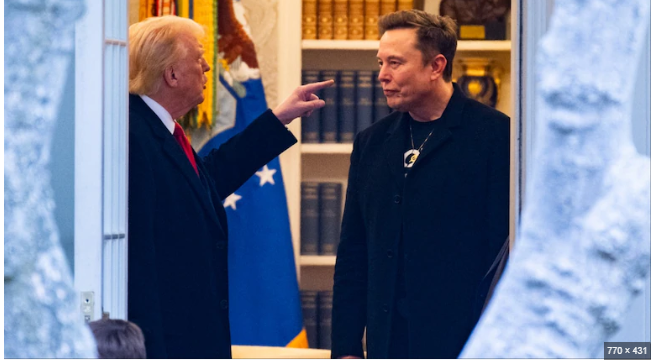By Toheeb Omotayo
In Nigeria, where elite power tussles often impede governance and economic progress, the ongoing feud between U.S. President Donald Trump and billionaire Elon Musk resonates deeply. What started as a policy dispute over Trump’s “Big Beautiful Bill”, a $2.4 trillion tax-and-spending package, has escalated into a public battle of words, with insults, threats, and potential consequences for global markets and politics.
As the bill faces a critical Senate vote, this clash between two of the world’s most influential figures offers lessons for developing nations like Nigeria about the dangers of unchecked power and its ripple effects.
The Origins of the Feud and How it Escalated
The rift exploded when Musk, the CEO of Tesla, SpaceX, and X, rejected Trump’s “Big Beautiful Bill”, describing it as a “disgusting abomination” that would bankrupt America by adding $2.4 trillion to the deficit over a decade, according to Congressional Budget Office estimates.
Musk, who, according to reports, spent $277–300 million supporting Trump’s 2024 campaign and briefly co-led the Department of Government Efficiency (DOGE), argued that the bill’s removal of electric vehicle (EV) tax credits would harm Tesla and undermine his cost-cutting efforts.
Reacting to Musk’s public outcry, Trump fired back on June 5, accusing Musk of opposing the bill out of personal pique over lost subsidies and threatening to cancel SpaceX’s government contracts. Against a backdrop of the initial display of public camaraderie, tension was brewing behind closed doors. Things got more dramatic.
The Tesla CEO hit back, with a claim that Trump owed his 2024 victory to his financial and political support, writing on X, “Without me, Trump would have lost the election, Dems would control the House and the Republicans would be 51-49 in the Senate.” Trump declared Musk had “totally lost it” and hinted at “serious consequences” if Musk backed Democrats.
Senate Showdown and Political Fallout
As of June 10, 2025, the “Big Beautiful Bill” faces a precarious path in the Senate, where Republicans hold a slim majority and can afford only three defections. Musk’s campaign, including a “Kill Bill” meme invoking Quentin Tarantino, has emboldened fiscal conservatives like Senators Rand Paul and Mike Lee, who oppose the bill’s debt ceiling increase and Medicaid cuts. Paul, aligning with Musk, told TIME, “If you had a teenager that you were giving $100 a week and they wasted all of it on gambling or on booze, would you give them $200?”
However, some Republicans, like West Virginia’s Shelley Moore Capito, insist Trump’s influence outweighs Musk’s, stating, “No matter what Elon Musk says, it’s still going to be second fiddle to President Trump.”
The feud may paradoxically strengthen the bill’s chances. By framing Musk as a foil, Senate and House leaders have rallied Republicans to support Trump’s agenda, with some, like Representative Tim Burchett, folding under pressure despite initial objections.
Analysts suggest Musk’s personal attacks, especially the Epstein claim, have alienated potential allies, making it easier for Trump to consolidate support. If the Senate amends the bill, potentially addressing concerns from moderates like Susan Collins or fiscal hawks like Paul, it will return to the House, where slim margins and holdouts like Representative Mike Lawler could complicate passage.
Economic and Global Implications
The feud’s financial toll is already evident. Tesla’s stock dropped 14% on June 5, erasing $150 billion in market value, while Trump’s Truth Social fell 8%. For Nigeria, where foreign investment drives tech and infrastructure development, such volatility signals risks. SpaceX’s Starlink, poised to expand internet access in Africa, could face setbacks if Trump follows through on contract threats. Tesla’s EV innovations, which Nigeria eyes for sustainable transport, are also at risk if Musk’s empire falters.
Globally, the feud underscores the fragility of economies tied to powerful individuals. Nigeria’s tech sector, aspiring to emulate Silicon Valley, depends on stable global markets. A prolonged Musk-Trump rift could disrupt supply chains, deter investors, and slow clean energy transitions critical for climate-vulnerable nations like Nigeria.
A Nigerian Perspective on Power and Accountability
In Nigeria, we’ve seen how elite rivalries, between politicians or business moguls, can paralyze progress. The Musk-Trump feud mirrors this dynamic: two titans, once allies, now prioritize ego over public good. Musk’s ability to tank markets with a tweet and Trump’s threats to punish dissent highlight the dangers of concentrated power.
In weaker democracies, such clashes could topple governments or spark economic crises. Nigeria’s own history of elite infighting, from oil baron disputes to political betrayals, reminds us of the need for robust institutions to hold the powerful accountable.
The feud also exposes the limits of billionaire influence in politics. Musk’s $10 million donation to the Senate Leadership Fund and $40.5 million to get-out-the-vote efforts gave him clout, but his fallout with Trump shows that loyalty can be fleeting. For Nigeria, where political funding often buys influence, this is a warning: relying on wealthy patrons risks instability when alliances sour.
What’s Next?
Recent posts on X suggest the feud may be cooling. Trump, on June 9, wished Musk well, praising Starlink but firmly stating their relationship is “over.” Musk, while extending conciliatory gestures, continues to criticize the bill, hinting at supporting a new “America Party” to challenge both parties. The Senate vote, expected soon, will be pivotal.
If the bill passes, Trump’s agenda will gain momentum, potentially marginalizing Musk. If it fails, Musk’s influence could grow, reshaping Republican politics ahead of 2026.
For Nigeria and the Global South, the lesson is clear: we must build resilient systems that don’t hinge on the whims of billionaires or politicians. Investing in local tech, diversifying economies, and strengthening governance are critical to weathering global shocks. The Musk-Trump saga, though an American drama, reminds us that when titans clash, the tremors reach far beyond their borders.
Toheeb Omotayo is a Nigerian-based developmental journalist with a special interest in reporting on governance and technology.

